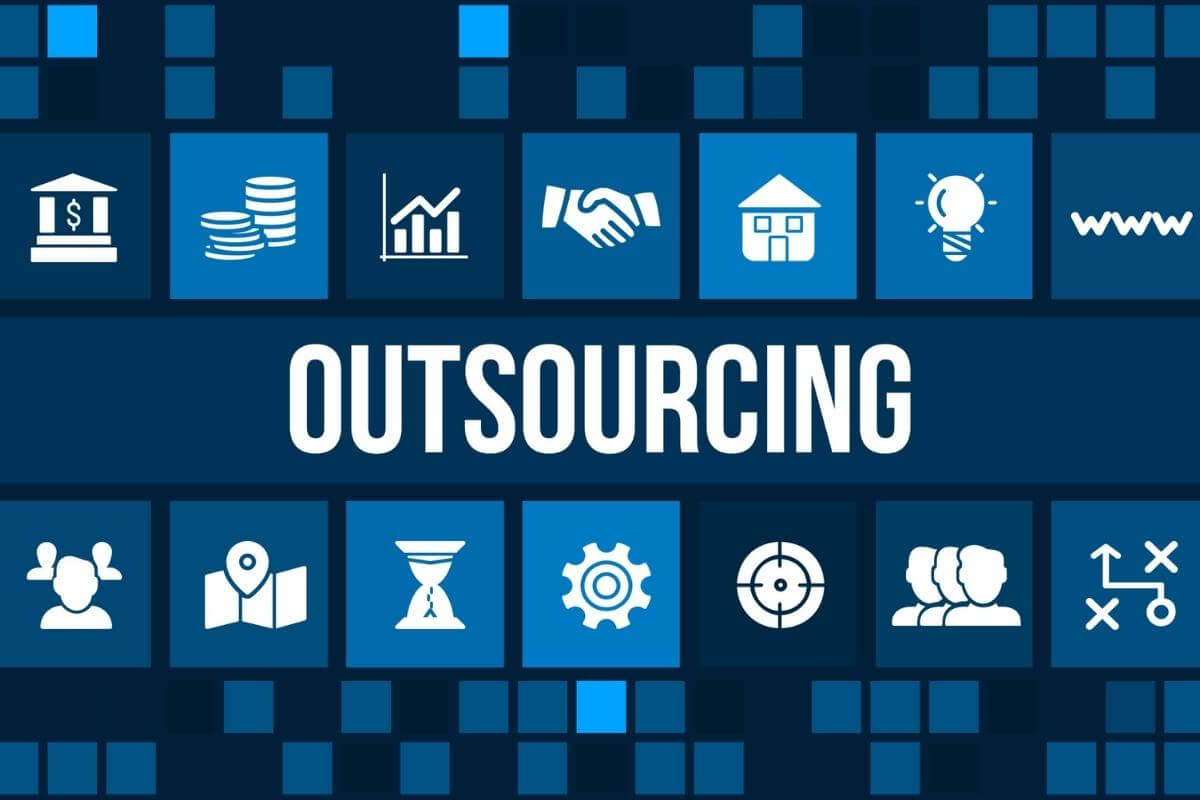IN THIS ARTICLE
Table of Contents
Every e-commerce business reaches a point where they need to identify the optimal scalability route. Whether to keep e-commerce functions in-house or outsourced comes into question. Business owners should not take this decision-making lightly because the implications will determine the success or failure of their businesses.
This article gives you a complete guide to e-commerce outsourcing, covering the types of outsourcing, services involved, their difference from insourcing, the challenges companies face, and how outsourcing can help your company. Read on to learn more.
What Is E-commerce Outsourcing?

E-commerce Outsourcing is a term that means subcontracting certain e-commerce functions to a third-party provider. Companies outsource operations that internal employees would have performed. With ecommerce businesses, companies can outsource data entry services, managing support tickets, technical support, web development, and more.
Plenty of e-commerce outsourcing initiatives are aimed at cost-saving. Companies that want to incorporate new resources into their workflow but can’t afford or don’t want to hire in-house employees might want to consider outsourcing a portion of their entire operations. E-commerce outsourcing can be domestic or international.
Roles and Services of E-commerce Outsourcing
The e-commerce industry is well-suited for outsourcing for various reasons. For one, many e-commerce firms are set up for remote collaboration and communication. Also, e-commerce staff performs most of the work using cloud-based systems, making it very easy to outsource.
Some of the industry’s most frequently outsourced services are:
- Web Development (both backend and frontend)
- App Development
- Customer Service Representative
- Chat Support
- Inventory Management
- Order Processing and Fulfillment
- Digital Marketing Specialist
- Technical Support Specialist
- E-commerce Specialist
- Sales Consultant
- Accounts Receivable and Accounts Payable Specialists
- Accounting/Bookkeeping
- Account Manager
E-commerce Outsourcing vs. Insourcing

E-commerce outsourcing is the act of contracting third-party labor; insourcing refers to the practice of employing an internal workforce to execute specific tasks.
Let’s take an e-commerce company that functions entirely remotely as an example. A business of this sort will include web development, product management, administration, inventory, order processing and fulfillment, customer services, marketing, and sales.
Breaking down one of these departments, say customer service, you’ll see that it’s responsible for multiple tasks, including email support, tech support, etc. A smaller business may have one or two employees assigned. However, companies will reach a point when they must employ a dedicated team to manage each activity.
This is when businesses must decide between e-commerce outsourcing or insourcing. For instance, companies may consider outsourcing customer support if the function has become too overwhelming for the internal staff.
Although the in-house staff is easier to manage, and their services will always be available, e-commerce outsourcing may make more sense considering the cost savings and other benefits.
Types of E-commerce Outsourcing

Different types of e-commerce outsourcing services are available. Understanding how each one works will help you decide what best fits your needs.
Offshoring
One practice businesses use to save on costs is called offshoring. This refers to moving a certain department or your entire e-commerce operations to a foreign country.
Plenty of consumers and entrepreneurs tend to confuse offshoring with outsourcing. They automatically assume that e-commerce outsourcing only pertains to farming out jobs to another country. Offshoring and outsourcing are two different business strategies, but you can surely merge them.
Most often, e-commerce businesses that market their goods practice offshoring. The manufacturing costs and other related expenses are high in countries like the US, prompting e-commerce companies to move certain functions to places like the Philippines, where labor is cheaper.
For instance, e-commerce businesses can employ both strategies by outsourcing email support to third-party providers outside their home country. In so doing, they can cut back on costs while tapping into wider talent pools.
Nearshoring
Nearshoring is when you outsource one or more functions to another country within a similar time zone or the same continent. For instance, a US-based company may consider Panama or Mexico for inventory management outsourcing. Likewise, a UK-based business can move its e-commerce support to Bulgaria or Poland.
In both e-commerce outsourcing cases, the company can take advantage of a more diverse talent pool, lower labor costs, similar business hours, and perhaps direct transport links. Additionally, you can reduce training time, especially if the roles you’ll outsource are customer support jobs, since you may have a mutual cultural understanding or shared language.
Domestic Outsourcing
Domestic or onshore outsourcing is a strategy where e-commerce companies delegate certain functions to external providers based in their local country. Back office functions such as IT operations and accounting can be outsourced to domestic third-party providers.
Onshore outsourcing keeps your teams focused on core responsibilities and eliminates the need for additional equipment, office space, employees, and so on. The only downside is that domestic outsourcing tends to be more expensive than offshoring or nearshoring. However, it has an edge when it comes to cultural familiarity.
Project Outsourcing
Sometimes businesses find it challenging to manage one of their projects or even a portion of a specific project. That’s why many choose to outsource some processes to BPO companies.
In other cases, the business may not have adequate internal employees with the required skills to complete the project. It may also be more expensive to accomplish the task internally than delegate it to a more qualified external company.
Process-Specific Outsourcing
Today, it is common to farm out certain operation-related aspects of a business to an external provider or company specializing in the said service. For instance, an e-commerce brand can outsource the delivery of products to a courier company.
Such an agreement would then call for details on customer contacts, costs, and delivery times. Process-specific outsourcing allows companies to concentrate on their strengths and improve service while mitigating time and costs.
Challenges E-commerce Companies Face

The global e-commerce growth rate is slowing down, but retail sales are rising.
In 2022, global e-commerce sales are expected to reach $5.542 trillion, a 12.2% increase but slower than the previous few years. The 16.3% growth rate in 2021 was shy of the 26.4% in 2020. This slowdown is expected to continue until 2025.
Some parts of the world continue to have strict in-person shopping rules in response to the ongoing COVID pandemic, so internet sales are expected to climb somewhat slowly. E-commerce’s percentage of retail sales will rise and is expected to grow from 20.3% in 2022 to 23.6% by 2025.
Although e-commerce giants like eBay and Amazon paved the way for establishing the industry and continue to be a force to be reckoned with, companies of all sizes knew they needed to get on board the online shopping train or risk being left behind. There is no doubt that e-commerce is here to stay.
E-commerce has plenty of advantages as well as challenges, though, among which are those listed below.
1. Competitive Pricing
Having a successful e-commerce business requires a strong focus on lean management. Today’s consumers can compare prices with a mere click of a button, making online shoppers well-known for being very price-conscious. Reports show that online customers visit e-commerce sites at least three times before buying a product.
This shows the growing need for competitive price offers. Additionally, price comparison sites promote e-commerce businesses that need to compete with service and pricing. Focusing on the lean operation is paramount since each dollar counts in the fight to establish competitive pricing.
2. Lowering Overheads
Overheads are ongoing business costs unrelated to producing your goods and services. Overhead expenses that detract from your bottom line include:
- Facility rent.
- Office equipment used by employees.
- Utility bills (think electricity costs).
Overhead expense is where e-commerce businesses have a significant advantage over other types of firms. While traditional brick-and-mortar shops have high overheads, the nature of e-commerce means these companies have low overhead expenses. Hosting an e-commerce site is cheaper than running a physical store.
All businesses, especially physical ones, need to prioritize reducing overhead expenses wherever possible. Problems arise when firms try to grow e-commerce operations simultaneously with physical operations. Scaling a business requires a complementary increase in spending, so e-commerce shops must find a way to keep spending at a minimum.
3. Managing Labor
One of the areas e-commerce companies have in common with traditional shops is the labor-intensive startup phase. When creating a brand or getting ready to offer a product, there is no escaping the long hours you need to spend developing processes, platforms, and products to attain long-term success.
Even after the initial cash layout is done, continued maintenance is labor-intensive. Hiring and training employees are among the highest expenses for any company to endure, especially in lean e-commerce that only blossoms on low overheads.
4. Competition
Although delivering competitive pricing, goods, and services is paramount for all businesses, the cutthroat nature of e-commerce puts more pressure on managers and owners. As the e-commerce industry becomes even more saturated, standing out from the crowd poses an ever greater challenge.
Making sure your website looks professional enough and that your platform search engine is optimized are only two critical factors for a business to gain new customers, let alone carrying out background processes to generate high-quality results. In a fast-paced industry like e-commerce, the ability to market quickly is imperative. You should focus your efforts not only on keeping up with change but on remaining ahead of it.
5. Round-the-clock Support
Unlike a physical store that closes its shop overnight, the online market never sleeps. Mobile devices have forever changed people’s lifestyles, with analysts claiming that 90% of users keep their phones within close reach. Modern consumers can not only interact with e-commerce brands anytime, anywhere – they expect it.
For that reason, e-commerce companies need to ensure they can meet customer demands 24/7. They should also deploy robust IT support to address and rectify any issues that customers might have.
6. Flexibility
If the previous few years taught us anything, e-commerce companies must act fast when opportunities arise. When demands for online goods and services increased, agile firms ready to scale benefited the most. Although the future is unpredictable, access to a highly scalable e-commerce outsourcing solution is critical to keeping up with unexpected growth.
How Can E-commerce Outsourcing Help?

E-commerce outsourcing can have various meanings to different individuals. However, it is undeniable that it’s an effective way to reduce costs, be more efficient, and stay competitive.
Recruiting external employees to support a business has proven to play a key role across several sectors and industries. More and more companies are turning to e-commerce outsourcing to streamline workloads, reduce overheads, and ultimately scale their business.
Improved Quality and Efficiency
Although some people find it hard to understand how outsourced staff can be as devoted to a company’s visions as internal employees, many e-commerce owners know better. Outsourcing certain tasks to specialized professionals with skills and experience that only top-notch individuals possess have proven successful for several e-commerce brands.
From developing an e-commerce website to deploying inventory management software, outsourced employees can tackle many tasks using their long line of experience with no fuss.
Many e-commerce outsourcing companies also make sure their offshore team is committed to the company they work for, giving you the chance to choose your staff without sharing with other clients.
Decreased Costs
Undoubtedly, one of the primary motivators behind e-commerce outsourcing is the cost advantage. Subcontracting ecommerce activities to providers from countries like the Philippines allows companies in the west to save up to 70% on wage payouts. You can also avoid the added infrastructure investment needed to put up new departments or offices.
Scalability
The pandemic has shown the need for e-commerce companies to be agile enough to scale quickly. With more consumers expected to turn to tech-based firms in the near future, online businesses must meet requirements on this class of customer’s terms.
Establishing a business requires a significant initial investment, be it software, IT support, infrastructure, data storage, office space, or recruitment. Such significant domestic spending makes scaling an incremental, iterative, slow process inevitably with zero margins for error.
Now picture e-commerce outsourcing where a third-party worry about the operational considerations and no sizeable upfront investment is needed. Growth can increasingly be motivated by current demand. Even more important, your e-commerce brand is better suited to downsize when situations change.
No costly offices are left unused. No expensive payouts for employees who are no longer required. Only the potential to upscale or downscale seamlessly and cost-effectively.
Access to a Global Talent Pool
E-commerce businesses that restrict themselves to recruiting only internal employees also confine themselves to a limited talent pool. With e-commerce often needing a service staff with specialized skills, it’s annoying when a domestic talent market does not have sufficient good quality candidates.
E-commerce outsourcing opens your company to a talent pool with staff from all over the world with respected experience in customer service, tech support, and data entry – to name a few.
Countries like the Philippines have a hard-won reputation for providing e-commerce outsourcing solutions that make financial sense and give access to dedicated and proficient employees. Hiring employees for short-term projects is a bonus, with e-commerce outsourcing letting companies use a flexible hiring process.
Higher Skills Level
E-commerce outsourcing provides access to a wider variety of experts and delivers high levels of skills. With e-commerce outsourcing solutions, you’re not working with someone who’s still learning about the process or managing sensitive data for the first time.
Instead, you can guarantee that your operations are in the safest hands, removing any need for micro-management.
If unexpected problems arise, outsourced employees can rectify them immediately instead of needing to hire a full-time specialist. You can concentrate on other, more pressing matters while experiencing the luxury of having your e-commerce operations managed by seasoned professionals.
Faster Project Turnaround Times
Dealing with an e-commerce outsourcing specialist means all procedures and systems related to establishing and maintaining your platform are implemented to suit your business. This makes it possible for your company to hit the market before your competitors do.
Establishing an internal development team requires a long time for recruiting and implementing processes. However, e-commerce needs to operate quickly. Time for getting services and products to the market is of the essence. By employing an e-commerce outsourcing firm, you can guarantee that work starts from the get-go.
Comprehensive Knowledge Base
A third-party e-commerce service provider spends time on one thing and one thing alone: selling products online. Compare that to your internal employees juggling e-commerce service issues between business management and product development.
A reputable e-commerce outsourcing team has the necessary skills to bring your operations to the next level. They can even help you expand your business internationally.
Top-notch Security Solutions
Remaining compliant with payment security protocols and local regulations is painless when you have a third-party partner managing compliance on your behalf. With e-commerce outsourcing, you give your shoppers peace of mind with secure checkout options and eliminate expensive chargebacks with robust fraud management solutions.
Various Payment Methods
Your clients are not restricted to one geographical area; why should your e-commerce business? Letting customers pay with their preferred payment method is one way to alleviate any friction during checkout, thus improving your store’s conversion rate.
Reliable e-commerce outsourcing platforms are fully armed with support for varying currencies and a range of alternative payment methods, enabling you to amass global sales effortlessly.
When does E-commerce Outsourcing Become Necessary?

Here are a few scenarios indicating a company should consider e-commerce outsourcing:
- When entering a foreign market: expanding to a new geographical market, and knowing its e-commerce landscape presents several challenges. Offshoring can help
- When a specific skill is needed: for example, when a business releases a new product line or category.
- When consumer needs require a considerable number of locations and facilities: taking advantage of the physical network of an outsourcing partner is an excellent way to quickly and effectively scale up.
- When the speed of selling becomes crucial: businesses can save weeks or even months by picking the best outsourcing partner in a specific market. In a fast-paced industry such as e-commerce, companies have limited time to get things right.
- When funds for investments are limited: if an e-commerce company cannot afford to invest in new infrastructure, it can tap into existing technologies and facilities.
- If your company is a startup: say your company is a startup. You have limited staff and want to focus on the primary business operations instead of spending much time on support functions. Consider hiring an outside contractor to manage your phone inquiries and contact us page.
- If you need multi-channel support: each platform requires a different infrastructure. If you want to offer multiple channels to your customer service, hiring a service proficient in all platforms and with first-class tools and staff makes sense.
- When you need customer support in multiple languages: if your customer is scattered around the world and speaks various languages, you’ll need agents who can communicate with them. Outsourcing allows you to cover more variety of language, round-the-clock, and across different time zones.
E-commerce Outsourcing Example

E-commerce outsourcing takes place worldwide, with businesses of all sizes, many of which you are probably already familiar with. Alibaba is one example of an e-commerce company that outsources its operations.
Several companies frequently come to mind when discussing the e-commerce landscape. Of course, eBay and Amazon, but one name that has quickly risen to the top is Alibaba. Unlike eBay and Amazon, Alibaba is a Chinese-based company that presents unique outsourcing challenges.
Many businesses outsource their operations to save money. They frequently relocate certain functions to countries such as China, India, and the Philippines, where labor is significantly cheaper. Still, several things change when the business is located in that region.
Although they could keep resource and manufacturing costs low locally, Alibaba recognized that they needed specific skills to grow that were unavailable at scale in their location.
Knowing this, Alibaba began looking for outsourced providers in the early stages of various projects and discovered that most of the skills they required were available in the United States. By outsourcing web development to US workers, the brand thrived and grew incredibly.
The takeaways of this case would be:
- Reason Behind outsourcing: tapping into a wider pool of skills and talents, taking quality to the next level, more attention to the primary business.
- Lesson to Learn: The main point from here is that you must fully understand your needs. By getting a grip on the skills lacking in your area, you can quickly look for available resources elsewhere to complete the tasks you need.
The Bottom Line

Managing an e-commerce business is not a set-it-and-forget-it endeavor. Succeeding in ever-changing rules and protocols surrounding proper compliance, growing consumer demands, and a highly competitive global market means companies should build innovative products and establish a smooth shopping experience.
Businesses should take advantage of the benefits of outsourcing to help increase productivity and have an overall more efficient operation. Consider areas of your organization that might benefit from e-commerce outsourcing and explore the available solutions at your disposal.
If you are looking for e-commerce outsourcing services, Unity Communications is ready to deliver the best solutions for your business. Get in touch with us now to find out more.





